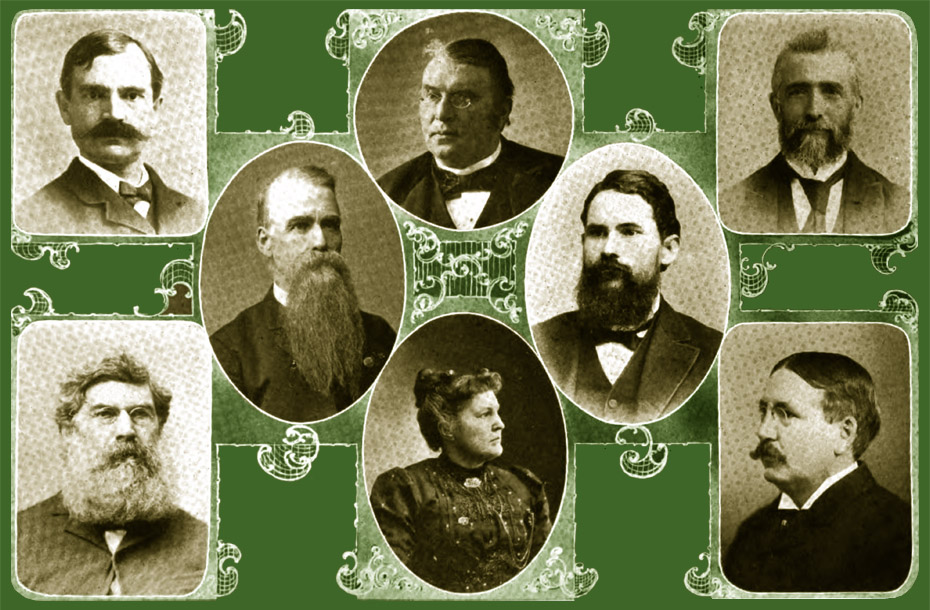Editors of the Free Thought Journals of America, (l-r) Top: L. K. Washburn — Editor “Investigator”, T. B. Wakeman — Editor “Torch Of Reason”, J. Spencer Ellis — Editor “Secular Thought”. Middle: H. L. Green — Editor “Free Thought Magazine”, J.D. Shaw — Editor “Searchlight”. Bottom: C. C. Moore — Editor “Blue Grass Blade”, Etta Semple — Editor “Free Thought Ideal” & E. M. Macdonald — Editor “Truth Seeker”. Image from Free Thought Magazine, Volume 19, Number 4. (April 1901)

Boston Investigator
Boston, Massachusetts, L. K. Washburn — Editor
The Boston Investigator was the first American newspaper dedicated to the philosophy of freethought. The newspaper was started in 1831 by Abner Kneeland, and published by John Q. Adams. It ceased publication in 1904 under the helm of L. K. Washburn.
Torch of Reason
Silverton, Oregon, T. B. Wakeman — Editor
The Torch of Reason was the official organ of the Oregon State Secular Union as well as the flagship weekly of Liberal University of Oregon at Silverton. It ran from November 5, 1896 to December 24, 1903. Pearl Geer and John Hosmer were the initial co-editors, with T. B. Wakeman taking over after Hosmer’s departure in early 1901.
Secular Thought
Toronto, Ontario, J. Spencer Ellis — Editor
Secular Thought, printed between 1887 and 1911, was a Canadian periodical, published in Toronto, dedicated to promoting the principles of freethought and secularism. Founded and edited during its first several years by English freethinker Charles Watts, the editorship was assumed by Toronto printer and publisher James Spencer Ellis in 1891 when Watts returned to England. During that period, Secular Thought was the principal organ of the freethought movement in Canada, publishing large amounts of material from England and the United States in addition to commenting on Canadian affairs.
Free Thought Magazine
Chicago, Illinois, H. L. Green — Editor
Starting in New York as The Freethinker’s Magazine, the magazine and editor/publisher H. L. Green later relocated to Chicago around the time of the Colombian Exposition. Renamed Free Thought Magazine, it’s motto was, “Hospitality to all truth and especially devoted to the exposing of ancient error by the light of modern science and intelligent criticism, and in all things will be liberal” was practiced by Mr. Green. Every person of character and ability, whatever may be his or her views, who had something to say and knows how to say it, received hearing in this Magazine. It is from the Google Book archives of the last ten years of this publication, we populate this site.
Searchlight
Waco, Texas, J. D. Shaw — Editor
The Searchlight was the leading Free Thought journal in the Lone Star State during the last decade of the Nineteenth Century. Editor J. D. Shaw also assisted in organizing the Liberal Association of Texas, and was its president the first year, and later secretary.
Blue Grass Blade
Lexington, Kentucky, C. C. Moore — Editor
The Blue Grass Blade was founded by Charles Chilton Moore in 1884 in Lexington, Kentucky. Due to financial and legal problems, he was only able to publish it sporadically. The journal contained articles advocating such positions as agnosticism, women’s suffrage, and prohibition. In February 1899, he was indicted for mailing obscene literature through the mail – a federal crime. The obscene literature in question was a discussion about free love that Moore had engaged in with a local judge in the pages of the Blade, but merely printing such a taboo conversation was enough to get him into a courthouse and set another historical precedent for the First Amendment. After spending several months in prison Moore was pardoned by President McKinley.
Free-Thought Ideal
Ottawa, Kansas, Etta Semple — Editor
In Ottawa, Kansas, Etta Semple was producing controversy of her own by publishing her freethought views in a liberal paper first called The Free Thought Vindicator and then The Free-Thought Ideal. The paper started as in 1895 when Semple turned her parlor into a print shop and began publishing the paper twice a month. Shortly thereafter it reached a circulation of nearly 2,000. Subjects in the paper ranged from football to women’s rights. The pervasive subtheme, however, was the rejection of religion. By 1901 the front page of the paper was carrying the streamer, “A Reward of $l,000 will be Given to the Man, Woman or Child, who will Furnish Positive Proof of A God, the Holy Ghost, Jesus Christ (as a savior), the Soul, the Devil, Heaven or Hell, or the Truth of the Bible.” In 1901, Semple decided that she was tired of “trying to talk sense to the rest of the world” and stopped publication.
Truth Seeker
New York City, New York, E. M. Macdonald — Editor
The Truth Seeker is an American periodical published beginning during the 19th century. It was considered the most influential Freethought publication during the period following the Civil War into the first decades of the 20th Century, known as the Golden Age of Freethought. In the first issue, on September 1, 1873, editor D. M. Bennett and his wife Mary proclaimed that the publication would devote itself to: “science, morals, free thought, free discussions, liberalism, sexual equality, labor reform progression, free education, and whatever tends to elevate and emancipate the human race.” Subsequent editors included Eugene and George E. Macdonald, Charles Lee Smith (along with his associate editors Woolsey Teller and later Robert E. Kuttner), James Hervey Johnson, and Bonnie Lange. Currently still in publication, Roderick Bradford mans the helm of this most long-lived of Free Thought publications.

